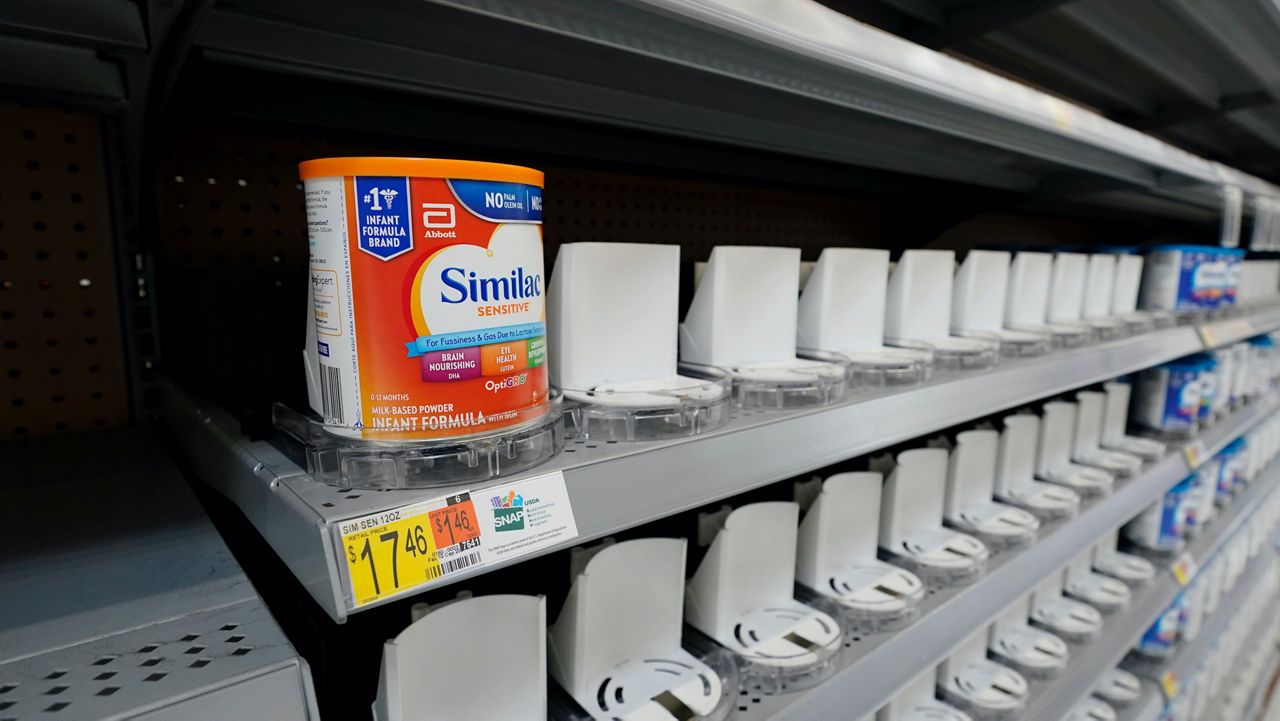It’s increasingly hard for families across the U.S. to find infant formula, and the situation is so dire that even one of the top children’s hospitals in the country is having trouble sourcing supplies for families in need.
“There’s concerns across the board,” Nicole Meadow, a clinical dietician within Children’s Hospital Los Angeles’ Heart Institute, told Spectrum News. “Because we have families call us multiple times a day, as far as what they can get for their baby’s needs, we’re dealing with all types of access issues.”
An existing shortage, blamed on supply chain issues and inflation, was exacerbated by the February voluntary recall of Abbott Nutrition’s formula brands, including Similac’s PM 60/40 formula, Alimentum, and EleCare powder formulas — all of which are designed for children with special dietary needs. According to a Centers for Disease Control investigation notice last updated in March, four children contracted an illness and two children died after drinking formula contaminated with a rare germ known as cronobacter sakazakii, which can cause sepsis or severe meningitis in infants.
According to the Associated Press, when the Food and Drug Administration visited Abbott’s Sturgis, Michigan, factory in March, inspectors found lax safety protocols and bacteria on several surfaces. None of the bacterial strains matched those collected from the infants, however. The FDA and CDC's investigation is ongoing. It’s unclear when the Abbott plant may reopen.
The shortage is hitting families hard at pharmacies and retailers. Two of the nation’s leading pharmacies, CVS and Walgreens, have limited formula sales to three items per person — and even still, shelves are often bare for families looking to feed their babies. Major retailers, including Target, Walmart and other national supermarket chains have restrictions on online orders, according to their websites.
According to Datasembly, a firm that collects real-time data from retailers across North America, 43% of the nation's baby formula supply is out of stock as of the first week in May. In April, more than half of retailers in three major metropolitan areas — Des Moines, Minneapolis and San Antonio — had out-of-stock rates at greater than 50%, while seven states (Connecticut, Delaware, Montana, New Jersey, Rhode Island, Texas and Washington) had out-of-stock rates higher than 40%.
“Inflation, supply chain shortages, and product recalls have brought an unprecedented amount of volatility for baby formula,” Datasembly CEO Ben Reich said in April. “We expect to continue to see the baby formula category being dramatically affected by these conditions. Baby formula stock has been one of the more affected categories so far in 2022, and one that will continue to demonstrate higher than average out-of-stock levels.”
Both CVS and Walgreen, in separate statements to Spectrum News, said that they’re working with vendors to address increased supply. Neither provided a timeframe as to when they expect shelves to be restocked.
On Monday, White House Press Secretary Jen Psaki said that the FDA is working with major formula manufacturers to ensure they're increasing production, and trying to streamline review of manufacturing changes and import entry processes from foreign plants.
"It is not just their responsibility, in their view, to ensure that we are meeting our obligations to protect Americans. It is also their obligation to take steps to ensure supply can be met when they take these steps," Psaki told reporters.
In a statement, Abbot Nutrition said it is “prioritizing production of infant formula products to replenish the supply in the market,” while also air-shipping formula from an FDA-registered plant in Ireland on a daily basis. The company also said that it’s working on ready-to-feed liquid formula products, and working with healthcare providers to determine alternative formulas where possible.
Meadow said that the team at CHLA hasn’t been given any dates as far as when more formula will be made available to the hospital. “It’s day by day, as far as when more will be available,” she said, noting that her hospital is working with vendors and insurance companies to acquire formula. “We’re waiting for answers as to when things will get a bit better.”
“As a team, based on physician and dietician [input], we’re really working with each other to help the families get what best fits their needs,” Meadow said. As part of that, she suggested that families may, if needed, swap formulas and brands from what they’re typically feeding their children to other FDA-approved formulas. (Though families should expect a bit of tummy trouble — gas or other minor discomforts — while making the transition.)
In the meantime, both Meadow and the FDA are strongly recommending that parents refrain from making their own formula, including using suggestions on social media, or archaic medical recommendations from decades past; that families not buy online, especially from sources where they’re not certain the product is genuine or has been stored properly; to not transition to solid foods or to formulas made for toddlers and urge that parents not try and stretch their supplies by watering formulas down.
“It’s really important — especially for little infants, but for older babies as well — that if [families] aren’t preparing formula correctly, that they could have micronutrient deficiencies, or caloric deficiencies, and not grow properly,” Meadow said.
Instead, Meadow recommends that parents call their children’s pediatrician, working with their family’s healthcare providers to find solutions.
“That’s what our patients are doing, and how we’re able to bridge those gaps when they’re in a very precarious situation,” Meadow said.
The Associated Press contributed to this report.



